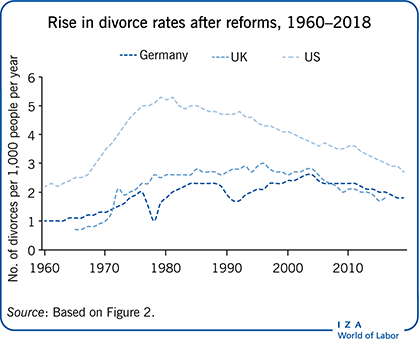Elevator pitch
Many countries have enacted legislation over the past few decades making divorce easier. Some countries have legalized divorce where it had previously been banned, and many have eased the conditions required for a divorce, such as allowing unilateral divorce (both spouses do not have to agree on the divorce). Divorce laws can regulate the grounds for divorce, division of property, child custody, and child support or maintenance payments. Reforms can have a range of social effects beyond increasing the divorce rate. They can influence female labor supply, marriage and fertility rates, child well-being, household saving, and even domestic violence and crime.

Key findings
Pros
Even though unilateral divorce leads to a larger number of divorces in the short term, it probably leads to better quality (if fewer) marriages in the long term.
Legalizing divorce leads to increases in labor force participation among married women.
Easier divorce—both legalization and allowing unilateral divorce—leads to higher household saving rates.
Unilateral divorce is associated with lower rates of domestic violence and female suicide.
Cons
Unilateral divorce leads to lower fertility and other marriage-specific investments.
Where the law requires splitting marital assets equally between spouses, allowing unilateral divorce may lead to a reduction in female labor supply.
Both legalizing divorce and allowing for unilateral divorce may lead to worse long-term child outcomes, including educational attainment and adult income.
Unilateral divorce may increase the incidence of criminal behavior among children born slightly before and hence affected by the changes in divorce law.